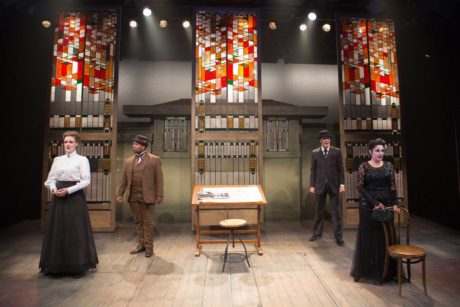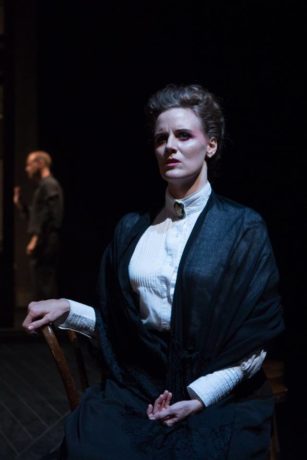Can an artist be true to his art as well as to his promises? Is destruction the price of creation? These are the questions at the heart of Shining Brow—music by Daron Hagen; liberetto by Paul Muldoon—and at the heart of the life of Frank Lloyd Wright on whom the story centers. Spanning 1903 to 1914, this self-proclaimed “usonian” version of Shining Brow under the direction of Grant Preisser strips back the façade of the famous architect, revealing his foil and true self beneath. Not a man of harmony or elegant form like that of his homes, but one whose ego is bent on perfect self-actualization and, in the end, self-destruction.
Taking on this complicated challenge was Sidney Outlaw as Frank Lloyd Wright. In “And her scent, was it musk?” and “Each room opens into the next” in particular, Outlaw’s powerful baritone showcased a man driven by the muse of passion and his quest of perfect form. It is as a result of Lloyd Wright’s single-mindedness that he pushes his relationships to the brink and forces the rest—in their unique own way—to mourn his loss and betrayal.

The most immediate of these relationships was with his wife, Catherine, played by the dignified Rebecca Ringle. A devoted wife crushed by the inconstancy of her husband, she pleads to keep her family together in the sorrowful aria, “If not for me that for the children’s sake.” Ringle’s warm, rounded mezzo gives Catherine’s grief roots and as her voice falls on deaf ears, Ringle’s transformation into a knowing, judging observer produces some spectacularly piercing looks that could break stone.

Replacing Catherine in Lloyd Wright’s heart was the fiery and strong willed Mamah Cheney played by Miriam Khalil. A near instant attraction, Mamah is swept up in the romantic world of Lloyd Wright’s art in “Some are destined to stand.” Only too soon, however, do the rosy windows begin to crack as Mamah realizes that even she does not hold enough sway to keep Lloyd Wright’s devotion entirely. In “Frank, how much longer must I endure…?,” Khalil’s powerful voice shake even herself into a true realization of what kind of a man Lloyd Wright is. But even then his pull on her is too strong and in “Together, Mamah, we will take…” they imagine a lifetime together come what may.
Helpless witness to the seduction and tragedy of his wife is Mamah’s husband, Edwin Cheney played by Ben Wager. With an animated but sunken face of a man made cuckold, Edwin suffers the length of days, months, and years in “three long days and three long nights.” And with his achingly resonant bass in “The truth is that my mouth is full of nails,” Wager lays bare a man unsure where or how to focus his anger, lashing out in all directions.
But perhaps the longest suffering is Lloyd Wright’s long-time mentor, Louis Sullivan played by Robert Baker. With every passing year and each betrayal watching his treasured pupil turn selfish, Baker’s Sullivan slips further into despair and further into the bottle. This tension Sullivan experiences between a mentor’s pride and a friend’s loyalty is most strongly felt in “Frank. Lieber Meister” and “For ten long years I’ve tried to heal.” Here Baker is at his strongest highlighting Sullivan’s torment with his skillful tenor.
Together, these wonderfully talented five are a beautiful pulse in the story unfolding on stage. As Lloyd Wright remembers the tragic moments of his life, Sullivan, Catherine, Mamah, and Edwin circulate in and out of the memory’s frame, shaping the offices, houses, and pyres of his lifetime as if in a dance that lasts forever. They are constant witnesses to the narrative even if they might not have been there in the initial moments, which drives Lloyd Wright to peacock more flagrantly but also, in the end, collapse inwardly more completely.
Excellently underscoring the tragic tale was a supremely talented crew. The set design by Grant Preisser echoed Lloyd Wright’s “form from function” mantra perfectly with beautiful sliding stained glass panels that ushered in the changes of time and place. The lighting design by Lucrecia Briceno pushed the emotion of each scene further, and the costume design also by Grant Preisser subtly tied the show together by emphasizing the character’s fates as well as the story’s end in the state of the stage come its dramatic fade to black.
Not to be overlooked, the members of the Inscape Chamber Orchestra under the baton of Robert Wood were also superb. Susanna Loewy on flute; Bethany Slater on oboe and cor anglais; Evan Ross Solomon on clarinet, Anne Donaldson on violin, Megan Yanik on viola, Kathryn Hufnagle on cello, and Molly Orlando on piano were essential in bringing this extraordinary story to life.
An excellent introduction to the world of opera for any newcomers or a wonderful expansion of the tradition for those who are already fans, UrbanArias’ Shining Brow debates the cost of artistry, passion, and what happens when we lose control of our lives in pursuit of perfection.
Running Time: 90 minutes with no intermission.
Shining Brow by UrbanArias runs through October 21, 2017 at the Atlas Performing Arts Center – 1333 H St NE, Washington, DC. For tickets, call the box office at (202) 399-7993 ext. 2 or purchase them online.





